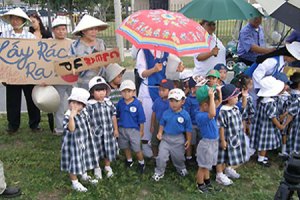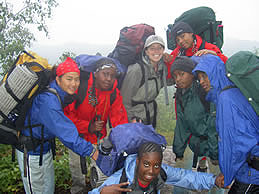Words by Malina Tran // Photos by Claudia Li
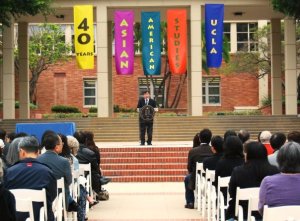
- During his speech, Nakanishi thanked several individuals for their contributions to the Center.
After 19 years under Don Nakanishi’s leadership, the UCLA Asian American Studies Center bids farewell to its longest-term Director and Professor, who will receive Emeriti recognition. On Saturday, May 16 the 40th anniversary celebration of “the Center” was a tribute to Don Nakanishi. Nakanishi plans to return and help advance his hometown, East Los Angeles.
In the span of four decades, “the Center” has established a record of achievements: tenure for Director Don Nakanishi, a department with Bachelor’s and Master’s degrees in Asian American Studies, scholarly literature such as Amerasia Journal which was established by Nakanishi as an undergraduate and AAPI Nexus.
The celebration was an echo of the community: Angela Oh, Professor Keith Camacho, Vice-Chancellor Claudia Mitchell-Kernan, Elsie Osajima. From Koreatown’s Freedom Sounds to multi-generational faces in the audience, the collective recognition of Don Nakanishi resonated throughout the plaza.
“Many of us consider Don as a visionary, but also as a personal friend and mentor,” said UCLA Professor Tritia Toyota. “His tenacity has made us a viable Center with students who are very committed.”
Professor Paul Ong of Urban Planning and Asian American Studies attributed Nakanishi’s leadership abilities to his success. “Leadership is about mobilizing people and I know no one else who can do that better than Don Nakanishi.”
“He is a true visionary,” remarked geography professor Cindy Fan, who notes cohort Nakanishi as “gentle and humorous, yet not [hesitant] to stand his ground.”
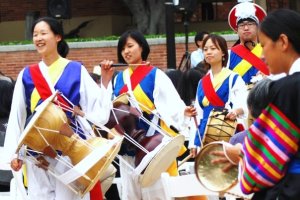
Freedom Sounds of Koreatown opened the ceremony, and represented the celebration of culture and commmunity.
Amid the speakers, members of the audience were also moved by Nakanishi and the role of the Center in their lives. “As the first journal in Asian American Studies, issue we covered have become significant, for example the first sexuality issue,” said assistant editor of Amerasia Journal Stephanie Santos. After attending graduate school in New York, Santos seized the opportunity of working at the Center.
Jih-Fei Cheng received his M.A. in Asian American Studies at UCLA and is currently pursuing his PhD at USC. In New York, Cheng was a board member of FIERCE (Fabulous Independent Educated Radicals for Community Empowerment), which was created for and by queer youth of color. FIERCE has battled gentrification especially in Greenwich Village, Manhattan.
A transfer from Mills College, Yuka Ogino is an Asian American studies student and event volunteer with several others. “[Being an Asian American studies student] I was able to see how powerful student voice is, which also inspired me to be involved in and run for leadership position in Asian Pacific Coalition.” Ogino will serve as next year’s Academic Affairs Coordinator for APC.
“Being in [the Master’s] program had a big impact on the way that I work with students, the people within the University and communities,“ said former graduate student Thomas Tsutsumoto, whose thesis on Pacific Islanders in higher education was overseen by Nakanishi. “Don helped me by challenging me to look at different ways of thinking.” Tsutsumoto currently works as a counselor at the University of Hawai’i.
Despite Nakanishi’s departure, the tone was not somber. The overcast sky and chilly weather clouded over Dickson Plaza; nevertheless, good spirits persevered throughout the ceremony.
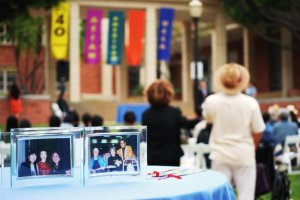
The ceremony was draped with banners and decorated with framed photos as centerpieces.
“I think that under the stewardship [of Don Nakanishi] that eternal question of whether or not the Center is connected with the community,” said Assemblymember of the 55th district Warren Furutani, “has been a resounding yes.” Furutani’s longtime friendship with Don started in Yale, during the time of Amerasia’s conception. “Even though you are wearing the same glasses you wore at Yale, you have come a long way, brother.”
“There are two Don Nakanishis,” said Assemblymember of the 49th district Mike Eng, “The one you call Dr. Don Nakanishi and bow humbly to [and is] recognized by people like President Bill Clinton and the Smithsonian Institute. The other Don I want to talk about is one whose just plain Don, who inspired me to conceive the first course for Asian Americans in law.”
Eng reminisces of how, likewise, there are two Asian American Studies Center. The first is recognized for its establishment of academic chairs, endowment of more than six million dollars, the only university-based press to publish on Asian Pacific Islanders, the departmentalization of Asian American Studies.
“The second center is the Asian American Studies Center in my heart,” said Eng, “The Center that was against male chauvinism, against imperialism, against our communities [being] victimized in neglect, the Studies Center that protested institutionalized racism of a society that we did not belong to. It was not defying what we were against; it was the Center that we came to understand what ideals and values we were for…peace, justice, intellectual honesty, and yes, for love.”
In recognition of the past, the prospect of the future lingers nearby. For the Center, the Amerasia Journal archives have recently become accessible online, allowing the history of writing from scholarly activists to be preserved. Podcasts of Asian American authors are in the process of being developed. This past year has moreover been focused on finding a new Director for the Center. For Nakanishi, returning to unincorporated East Los Angeles is coming to a full circle. For both the Center and Nakanishi, great changes are bound to come in future years.
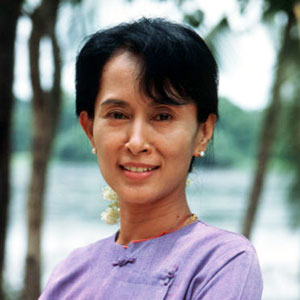
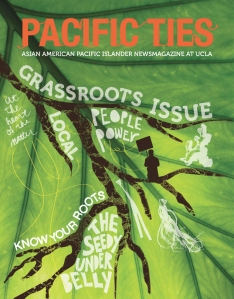 It’s that special time of the year again. Pacific Ties, your favorite LA based, 31 year-old AAPI news-mag is back again with another issue. Titled “Grassroots,” this issue explores your roots, my roots, and how are roots all came to this moment in time. Not really, but you have to read it to find out!
It’s that special time of the year again. Pacific Ties, your favorite LA based, 31 year-old AAPI news-mag is back again with another issue. Titled “Grassroots,” this issue explores your roots, my roots, and how are roots all came to this moment in time. Not really, but you have to read it to find out!


